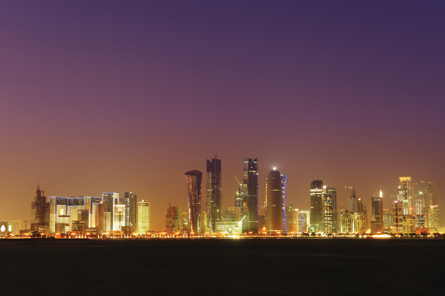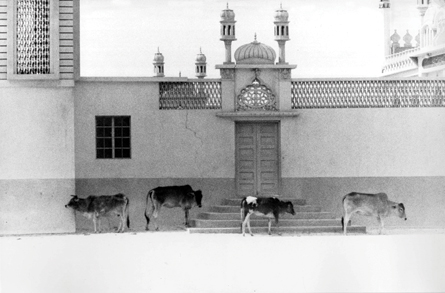Ever since the early years of the last century, when Persian and Arab merchants made their homes alongside Bedouin tribesmen in a dusty village around a creek in the British-ruled sheikhdoms of the Gulf coast, Dubai has been a haven for expatriates.
The city's breakneck expansion since then, especially in the past two decades, has seen foreigners outnumber local Emiratis by almost 10 to one. These newcomers power the economy and range from professionals who dominate the city's aviation, construction, finance and hospitality sectors to hundreds of thousands of guest workers from the Indian sub-continent, Southeast Asia and Africa who do the jobs others do not want: waiting on tables, driving taxis, collecting rubbish and working on building sites 50 storeys in the sky.
In recent years, Abu Dhabi and Doha in Qatar have been among those emulating Dubai with huge infrastructure developments and a population explosion comprising foreign workers. In all three - plus other Arab capitals such as Riyadh, Kuwait City, and Manama - huge communities of expats live a bubble-like existence. They can pursue career opportunities and enjoy comforts beyond what they could expect at home and, in the case of Dubai for instance, even own property, but without citizenship or many rights beyond the authority to work in the country as a temporary guest. They are also obliged to follow the laws of the country, which can range from a ban on alcohol in Saudi Arabia and Sharjah, to modes of behaviour based on Shariah law, even in the most liberal states such as Dubai and Bahrain.
 |
|---|
| © Rex Features The Gulf may no longer be a remote posting but culture shocks remain |
It is a bargain that increasing numbers of expats are happy to accept. In all but the most conservative countries, governments have been prepared to embrace or at least turn a blind eye to "Western" values - from drinking beer to bikinis on the beach - within certain boundaries. It is when these boundaries are crossed that trouble begins. What is acceptable in one's house or even in a hotel bar would be frowned on, or worse. Grasping these nuances, which vary from city to city, is one of the biggest challenges for many expatriates.
So what are some of the considerations for those mulling a move to the Gulf ? For citizens of most countries, once they have found an employer, obtaining the right to live in the region is reasonably simple, with applicants facing little of the red tape seen with some other immigration processes, although Saudi Arabia, for instance, remains restrictive.
"Although expats are required to obtain a residency visa from local authorities before they can work legally in the UAE or Qatar, which requires you to take a health test, your employer usually deals with it directly, making it a hassle-free process in the majority of cases," says Jim Vale, an American expat since 1989.
TAX FREE INCOMES
Apart from an abundant supply of Vitamin D with year-round sunshine, Middle East-based expats are generally financially better-off than their stay-at-home compatriots and Dubai, Abu Dhabi and Doha offer tax-free incomes. According to the International Monetary Fund (IMF), GDP per capita in Qatar is the world's largest at $100,000, while the combined GDP per capita for Abu Dhabi and Dubai hovers above $60,000. These compare with the taxable figures for the USA, the UK and the EU of $48,000, $35,900 and $34,000 respectively.
It's no surprise then that the financial dividends gained from a career move to the Gulf Cooperation Council (GCC) states remains a prominent incentive for expats. Geoff Wilson, an Emirates Boeing 777 captain and British expat of 10 years, says Dubai's tax-free salaries caught his eye, together with career prospects that would have eluded him in the UK.
"One of the main reasons I moved out here and have stayed here for so long is that there is no tax man," he says. "Moving to Dubai allowed me to begin my career as a long-haul pilot, guaranteed job security and promised rapid career progression."
Vale, a financial consultant, echoes Wilson's sentiment, but says Abu Dhabi, where he now lives after three years in Dubai, is more economically rewarding than Dubai.
"I moved to the UAE for a bigger salary. Before long I realised that Abu Dhabi was the Emirate with more money," he says. However, the lifestyle on offer in Dubai can offset the balance. "In terms of social infrastructure, Abu Dhabi is behind Dubai. The majority of people - especially expats - living and working in Abu Dhabi head to Dubai at the weekends to spend their leisure time there because it has more to offer," he says.
British expat Louise, a former marketing and communications manager who moved to Doha in 2010 after living in Dubai for eight years, says the Qatari capital is even more socially unfurnished than Abu Dhabi. "In a nutshell, Doha is Dubai 15 years ago: it's a barren landscape. There's nothing like Dubai Mall, Ski Dubai or a regular fixture of high-calibre sports events in Doha yet."
But that state of affairs is not set to last in the city that will stage the football World Cup in 2022. "With Qatar's wealth and the levels of investment going into planned business and sporting infrastructure, especially with the World Cup arriving in 2022 and Qatar Airways making international travel easier, the city has a lot to look forward to," she says.
SAFE HAVEN
Apart from Bahrain, with its majority Shiite population ruled by a Sunni elite, the revolts of the Arab Spring barely touched the Gulf. There are a number of reasons for this. One is the relative wealth enjoyed by the citizens of most of the GCC, particularly in Dubai, Abu Dhabi and Qatar. Another is the style of government, although far from democracies, the emirs have ruled benignly, largely investing government revenues in the economy, education and infrastructure - a marked contrast to the corruption and brutality of some of the other Arab countries subject to popular uprisings. A third reason is the large majorities of expats who mostly stay well clear of politics.
In fact, in some ways, the UAE and Qatar have benefited from the Arab Spring and earlier upheavals such as the Gulf wars, proving safe havens for capital and investment as well as fleeing professionals. Protected by defence pacts with the USA and European powers, the Gulf governments have generally maintained cordial relations with most of the Arab world as well as potentially troublesome neighbours such as Iran. To date, there has been little incidence of terrorism in the Gulf states, besides a spate of attacks in Saudi Arabia a decade ago, and a low crime level makes the region one of the safest places in the world to live.
 |
|---|
| © Rex Features That was then: Dubai in 1971, when there were more cows than cars |
Dubai's more than 2 million population comprises 90% of expats, rendering the Emirate a melting-pot par excellence, which, Wilson says makes cultural integration easy: "With such a large expat community, you don't have to integrate with the locals," he says. "But you can't forget you're in a Shariah-complaint state. And you have to comply with the rules: insults to the local culture are punished heavily."
Islamic festivals such as Ramadan can be "tedious" in Abu Dhabi, according to Vale, when no eating is allowed in public, and all the food outlets are closed in malls, "but that's just something you learn to cope with", he says.
Of the three cities, Doha is the most deeply-rooted in Islamic conventions, Louise believes: "The Arabic culture in Qatar is much more conservative than Dubai, making it harder to adjust to than Dubai, which is noticeably more westernised than here."
Although expats in the region enjoy a tax-free existence, living is far from cheap. In the boom years of Dubai, which ended in the financial crash of 2008, speculative house buying and inflation were pushing rents out of the range of many professionals, although prices have settled somewhat since then. It remains a bit of a trade-off.
"Although the cost of living is expensive, especially for imported rather than locally-sourced goods, the employment packages you're offered out here balance everything up," says Wilson, adding that it may depend on your job contract. "For instance, accommodations costs - the biggest expense in Dubai - are paid for; and I also receive financial assistance with schooling costs for my young ones," says Wilson. However, not all employers are so generous.
There are items that are considerably cheaper than elsewhere, such as petrol for instance. "Unlike the UK, the low cost of fuel means we can run a four-by-four vehicle. And taxis are also easily affordable," says Louise.
So while you might gawk in shock at the price of stuffed bell peppers, or a block of French cheese, you can equally expect to be astonished, in a nice way, when you re-fuel your family saloon at a petrol station for a little over $10. The average pump prices of $0.50 per litre contrast with the UK's $2.13 per litre.
WORLD'S CENTER
While the attractions of the Gulf - with its largely featureless desert, gleaming new buildings and searing summer heat - may fade after a while, perhaps one of the biggest advantages of living in the region is its closeness to home and some of the most interesting parts of the planet. With the big three Gulf airlines going all out to connect every major city in the world to their hubs, the region is the centre of the world.
"It gives you an opportunity to visit lots of countries that you wouldn't consider visiting from the UK," says Wilson. "Jordan and Israel are on the doorstep. And you're closer to the Asian isles, and the Orient."
And while the region these days offers much in the way of home comforts - from cricket test matches to touring rock bands, restaurants to suit every taste, to ice rinks, shopping malls, bowling alleys and multiplex cinemas - it is still "abroad". Those who appreciate the changing seasons, rolling green hills or even celebrity and political gossip might find themselves yearning for home.
While a tax-free salary and attractive career lure many an expat to the region, those with families in particular, need to bear in mind the availability of good properties and schools, and life in a very different society.
The Gulf may no longer be an exotic outpost where making a home will entail hardships and sacrifice, but culture shocks can remain. The region remains a land of promise, but "consider every aspect before you move out here", warns Louise.
Source: Flight International























